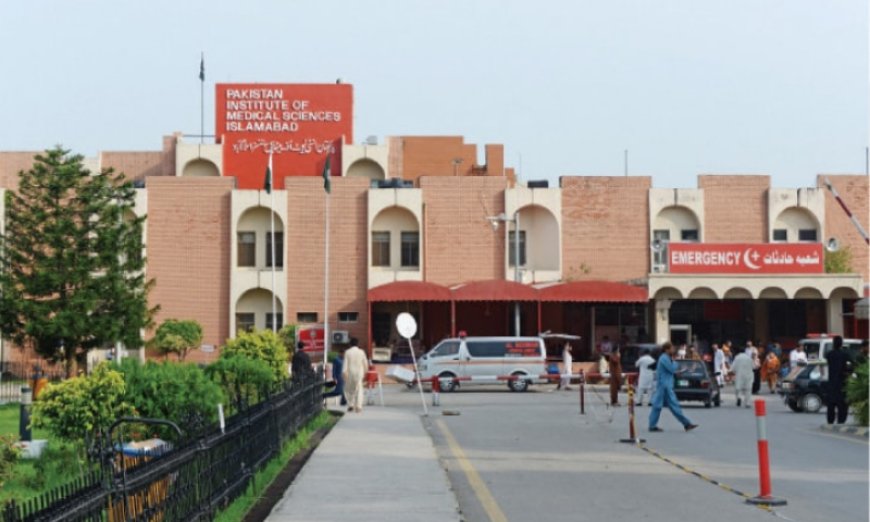PIMS Hospital’s 24/7 Heart Service Adds Financial Pressure for Islamabad Patients
PIMS Hospital Islamabad, heart patients Pakistan, 24/7 angioplasty service, Sehat Card, cardiac treatment Pakistan, healthcare inequality, Pakistan medical news

The Pakistan Institute of Medical Sciences (PIMS), the country’s largest government-run hospital, has expanded its Cardiac Centre to offer 24/7 emergency angioplasty for heart-attack patients a much-needed service that now runs day and night.
But for thousands of residents in Islamabad, Gilgit-Baltistan, and Azad Kashmir, the lifesaving treatment now comes with a financial shock.
Round-the-Clock Relief, But at a Cost
The new around-the-clock facility ensures that patients suffering from acute myocardial infarction (commonly known as heart attacks) no longer have to wait hours for treatment. Instead, doctors, nurses, and technicians remain on standby to perform immediate primary percutaneous coronary intervention (PCI) a crucial procedure that can restore blood flow and prevent cardiac death within minutes.
While this is a major medical advancement for public healthcare, patients are being told they must bear the full cost of stents and surgical consumables if they are not covered under the Sehat Card Plus programme used in Khyber Pakhtunkhwa (KP).
The out-of-pocket expense between Rs 150,000 to 200,000 per procedure is beyond the reach of many families in the federal region.Unequal Access to Emergency Care
The decision has reignited debate over healthcare inequality in Pakistan.
Heart patients from KP continue to receive completely free cardiac treatment at PIMS, subsidized by the provincial Sehat Card initiative.
In contrast, Islamabad’s own residents, who rely heavily on PIMS as their primary public hospital, must now arrange funds on the spot for life-saving treatment.
Health advocates call this a two-tier system that discriminates against citizens based on provincial jurisdiction.
“Equal access to emergency care should be a national right, not a regional privilege,” said one senior cardiologist at PIMS, requesting anonymity. “When every minute counts in a heart attack, cost barriers can turn survival into a luxury.”
Inside the Hospital: Staff, Strain, and Sustainability
Sources inside the Cardiac Centre say the staffing situation remains fragile.
Although the angioplasty unit is officially open 24 hours, it currently operates with only three technicians each juggling day and night emergencies.
Officials are now seeking to recruit at least six more skilled professionals and secure government funding for stent procurement to make the service sustainable.
Medical staff admit that the introduction of the new service has overwhelmed existing capacity.
With rising cases of hypertension and heart disease in urban Pakistan, cardiology departments at public hospitals like PIMS are handling three times their intended load.
Expert Opinions: Experience Meets Evidence
Healthcare experts commend the effort but warn that technological upgrades without equitable access could deepen Pakistan’s public health divide.
Cardiologist Dr. Farzana Malik:
“PIMS has the experience, equipment, and expertise to run 24/7 cardiac care efficiently. But when affordability becomes a barrier, expertise alone can’t save lives. Accessibility must be built into every innovation.”
She emphasized that early angioplasty can reduce heart-attack fatalities by up to 40%, provided treatment is available within the golden hour the first 60 minutes after the onset of symptoms.
Accountability and Transparency
According to health ministry officials, the new fee structure is not a profit model but a temporary measure to cover imported equipment and consumables amid rising costs.
However, public watchdogs are calling for greater transparency in pricing and budget allocation, urging the government to expand national health insurance to include Islamabad and federal territories.
The Bigger Picture
Pakistan records nearly 400,000 new cardiac cases annually, with heart disease remaining the leading cause of death in the country.
While private hospitals charge up to Rs 600,000 for similar procedures, PIMS remains the most affordable option for critical cardiac patients yet affordability does not mean accessibility.
For more updates, visit Nation bytes

 Israr Ahmed
Israr Ahmed